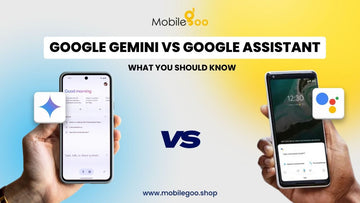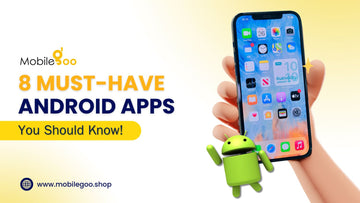
For years, Google Assistant has been used by millions of people to handle everyday tasks. Everything is possible with just a voice command — setting alarms, answering quick questions, turning off the lights, or sending texts. The convenience that comes with using Google Assistant makes it a natural part of daily life. You do not have to think much about it. Just say, “Hey Google,” and get things done.
But now, Google has introduced something very different: Google Gemini. While many people think that Gemini and Assistant are kind of similar, they are actually quite different. Gemini is not just a voice tool like Assistant — it is much smarter. It can think and have conversations like a person. You can use it to strategise plans and figure out solutions.
If you want to use these tools effectively to make your day-to-day tasks easier, you need to clearly understand the differences between them and how to use them. In this blog, we will help you do exactly that.
INDEX
Key Differences: Google Gemini vs Google Assistant
Google Assistant: Built for Speed and Everyday Tasks
Everyday Simplicity
Integrated with Smart Devices
Works Offline
Not Meant for Complex tasks
Google Gemini: A New Breed of Assistant
Far More Capable
Multimodal AI
App-Based, Not Always Integrated
Still Learning to Work with Devices
Should You Use Google Gemini or Google Assistant?
Frequently Asked Questions About Google Assistant and Google Gemini
1. What type of AI is Google Assistant?
2. Which phones have Google Gemini?
3. Does Google Gemini work offline?
Key Differences: Google Gemini vs Google Assistant
|
Feature / Focus |
Google Assistant |
Google Gemini |
|
Primary Design |
Built for fast and command-based actions. |
Designed to hold deeper and contextual conversations. |
|
Interaction Style |
Short voice queries and direct responses. |
Ensures chat-style interactions with memory of context. |
|
Best Use Cases |
Can be used to manage tasks, ensure smart home control, and provide real-time voice help. |
Best for writing, researching, or summarising. You can get creative or complex responses. |
|
UI Presence |
Triggers from long-pressing the home button or voice command. |
Runs inside a separate app and in certain Google apps (Docs, Gmail). |
|
Smart Suggestions |
Very limited knowledge. Can search online or provide system-level suggestions. |
Powered by next-gen AI, it can suggest next steps and give follow-up ideas. |
|
Privacy & Response Storage |
Minimal interaction memory — no long-term context. |
Can hold context in a session and provide responses accordingly. However, it cannot hold full memory, like ChatGPT. |
|
Availability |
Pre-installed and activated on most Android phones. |
Needs to be manually enabled or installed on most devices. |
Google Assistant: Built for Speed and Everyday Tasks
Google Assistant was designed before the AI revolution and has been the go-to digital helper on Android phones, smart speakers, displays, and even cars. While it does not have too many complex features, it is fast and reliable for doing various tasks.
Everyday Simplicity
Google Assistant is great at things that do not require much thinking. For instance, you can set a timer, send a quick text, or even turn on your living room lights without touching your phone. Therefore, the interaction is very simple and provides a quick solution.
However, this feels less like talking to an assistant and more like using a voice remote. You are not having a chat.
You can say things like:
“Set an alarm for 7 a.m.”
“Text Rahul: running 5 mins late”
or,
“What’s the weather in Delhi?”
And your phone will respond in a second or two. Tapping on your phone or even unlocking the device is not required for this. Everything can be done hands-free, even when you are driving or working out and cannot access the device.
Integrated with Smart Devices
One of the biggest advantages of Google Assistant is the smooth integration it provides with smart devices. It was built with the smart home in mind. You can connect it with thousands of smart gadgets, like bulbs, fans, AC, and even door locks.
Not just that, you can group devices into rooms and create voice-controlled routines like “Bedtime” or “Movie night.” This way, you do not have to manually control each device to create the desired environment. Just one command will change everything. And the best part is that you can control everything just sitting on your couch.
Works Offline
Another benefit of Google Assistant is that you do not always need an internet connection to use it. Many features, like calling contacts, setting alarms, or launching apps, can work even when you are offline. This could prove to be very useful if you visit a low-signal area. You do not have to worry about Google Assistant not functioning due to a poor network.
Not Meant for Complex tasks
Even though there are many benefits of Google Assistant, it cannot do certain tasks — you cannot perform various complex tasks that may require thinking. So, you can never have a conversation with Google Assistant or ask for solutions. Also, you cannot ask it to research or brainstorm ideas. In short, Google Assistant is only meant for very simple tasks.
Google Gemini: A New Breed of Assistant
If you like using Google Assistant and have not used Google Gemini yet, you might just like it. Google Gemini can actually do a lot more than you can expect from Assistant. It is more like an AI tool, like ChatGPT, that can respond to your voice commands. So, you can expect it to create images, provide solutions for various problems, and answer like a human being answers.
Gemini can remember conversations to a certain extent. So, you can even refer to previous conversations when talking about something or giving instructions.
Gemini is built on the same kind of language model technology that powers tools like ChatGPT. So, do not mistake it to be just another voice assistant. You can even ask it to analyse and interpret images or code. Additionally, it is tightly integrated with Google’s apps and services, just like Google Assistant.
Far More Capable
What really sets Gemini apart is its ability to carry on a real conversation. You can ask it to help you write a pitch deck you are preparing for a client. Or, if you find a long article and do not have the time to read it, you can ask Gemini to summarise it. Planning a trip? You can even ask Gemini to compare different travel options based on budget and season.
If you are not happy with any answer, you can always ask follow-up questions. For instance, if Gemini recommends a particular month for travelling, you can always ask things like, “What if I go in November?” and Gemini will provide a proper answer about the pros and cons.
So, it is not just answering questions. Gemini can reason, revise, and respond in a way that feels more like talking to another human.
Multimodal AI
With Gemini, you do not have to rely just on texts. Gemini can read images, charts, or even codes. So, if you come across something that you do not understand, you can simply upload it. Gemini scans it and then explains it clearly. You can also ask Gemini to fix mistakes or make certain changes to it.
Who Can Use it?
-
Students who want help understanding math problems or diagrams
-
Developers debugging code
-
Professionals reviewing documents or data
Google Assistant can never compete with Gemini in this case. What Assistant does is just listen and answer. But, Gemini can properly analyse your every instruction and provide answers. For instance, you can share a few details about yourself and ask Gemini to make a resume for you.
App-Based, Not Always Integrated
Google Gemini does not come pre-installed on your phone like Google Assistant. This means you will have to download it. On Android, it runs as a separate app. If you do not want to download the app, you can access it through the web too.
The settings are different for Pixel users. You will have the option to replace Assistant with Gemini. However, not all Pixel users might get this option.
Right now, Gemini is also starting to appear inside Google Docs, Gmail, and other Workspace tools. There, it helps you write emails and format reports. You can ask it to summarise long email threads as well.
Still Learning to Work with Devices
While Google Gemini can be considered an upgrade, there is one area where it cannot compete with Google Assistant — it is not great at controlling hardware. So, you cannot ask it to do simple tasks like setting alarms.
Also, Google Gemini cannot seamlessly integrate with smart home devices like lights or locks. You cannot control your home devices sitting at one spot.
This does mean that Google Gemini is not smart — it simply means that Google Gemini has not been designed to perform those tasks, yet.
Should You Use Google Gemini or Google Assistant?
You do not have to pick one and forget the other — Google Gemini and Google Assistant are not really an either-or thing. Gemini was not made to fully replace Assistant. Not yet, anyway. Instead, they are designed to be used side-by-side to ensure more convenience for the user.
However, you may notice that your phone does not support Google Assistant or Google Gemini. This generally happens when the app or OS is not updated. Check for app updates and get the latest version. If the app is up-to-date, check your OS and update if outdated.
Also Read: The Importance of Regular Software Updates for Your Phone
If your phone is outdated and does not receive the latest OS updates anymore, the only option you will have on hand is to replace the phone. Do not buy a brand-new phone if you do not have the budget for it. You can buy refurbished phones online instead. They also get timely updates and function smoothly. At Mobilegoo, you can buy refurbished phones at the lowest prices. They pass through 55+ quality checks before being sold to a customer. You will get up to a 1 year warranty on them.
While you are at it, do not let your old device go to waste. Instead, you can sell your phone online to Mobilegoo. We offer a safe platform to sell old and used phones and get the best value. It is a simple 1 minute process where you just have to answer a few questions and confirm the sale. Our executive will visit you and pick up the device. You also get instant cash payment.
Frequently Asked Questions About Google Assistant and Google Gemini
1. What type of AI is Google Assistant?
Google Assistant uses rule-based and natural language processing (NLP) models to interpret voice commands and respond quickly. It is built on traditional AI designed for task execution and not deep reasoning. That means it is excellent for things like setting reminders, sending texts, controlling smart devices, or answering quick questions — tasks that follow a clear structure.
While it has become smarter over the years, it is not powered by large language models like Gemini or ChatGPT. Its focus is still speed and reliability.
2. Which phones have Google Gemini?
Google Gemini is available on most Android phones, but the experience varies depending on the device:
On Pixel 8, Pixel 8 Pro, and newer models, you can choose to replace Google Assistant with Gemini. These phones get the most integrated experience.
On other Android devices, you can access Gemini through the standalone app (downloadable via the Play Store) or through the web at gemini.google.com. While it is not yet available as a replacement for Assistant on older Android models, the app itself works fine on most modern phones running Android 12 or later.
On iPhones, Gemini can be used via the mobile browser. However, it is not integrated like it is on Android.
3. Does Google Gemini work offline?
No, Google Gemini does not work offline. Because it is built on a cloud-based large language model, it needs an active internet connection to function. Whether you are asking it to summarise a document or answer a question, the request is sent to Google’s servers and processed in the cloud.




